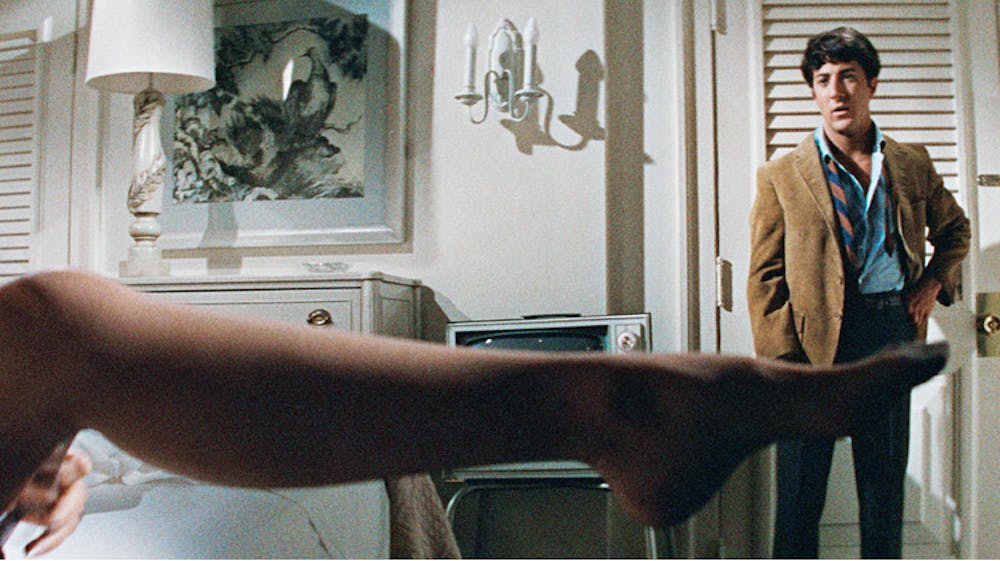“The Graduate” is my favorite movie. I begin with this disclaimer because though it is understandably controversial in and out of the world of film majors, I am incredibly biased in my commitment to loving it. I must also emphasize that I am not a film major. And despite my being raised in a household of movie lovers, I only consider myself qualified to write this review as a soon-to-be graduate, not as someone that has any interest in arguing with you over why you don’t think that the underwater birthday party scene is the most emotional thing ever to grace the silver screen.
The graduate in question is Benjamin Braddock (Dustin Hoffman), who returns home for the summer after graduating from a prestigious college with no plans for his future and without any external forces encouraging him to make any life-altering decisions, except for his parents. He was clearly a high-performer during his time in undergrad, but the minute he steps into the real world, none of it matters (the opportunity to draw parallels between your post-grad fears and Braddock’s assumed reality begins here). And if you can suspend your disbelief like I have and relate to someone who truly has no worries in the world besides whether he should go to grad school or continue to loaf about his Los Angeles home, perhaps you too will relish in the search for fulfillment upon which Braddock embarks.
At Braddock’s graduation party, thrown for him by his parents and attended by no one his own age, the titular character is asked to drive Mrs. Robinson (Anne Bancroft) home. Upon arrival at her large and empty house, Mrs. Robinson encourages Braddock to come inside, declaring, possibly feigning, fear of an intruder. Once inside, she makes a pass at Braddock (she takes all of her clothes off and locks herself in a room alone with him), only to be interrupted by the sound of her husband’s car pulling into the driveway.
Obviously, a weeks-long affair then ensues between Braddock and Mrs. Robinson, communicated by another cinematographic masterpiece montage of each of them walking in and out of the same hotel room, with each picture fading into the next as a marker of time passing. We are brought back to reality with another magnificent pool scene wherein the camera zooms out from Braddock’s sunglass lenses to show his parents pestering him, asking what he’s going to do with his life. The conversation ends with a clear conclusion: he must take Elaine Robinson (Katharine Ross), Mrs. Robinson’s daughter and the singular person that Braddock has sworn to his secret hotel companion that he will stay away from, on a date.
The date in question, on which Braddock tries to act disinterested but is ultimately smitten, becomes the turning point of the film. And though I refuse to spoil the rest, I would like to point you to the rain scene in the car and the silent screaming scene in the chapel as highlights from director and 1968 Oscar winner Mike Nichols. The intimate perspectives of the camera paired with the adapted Simon and Garfunkel soundtrack make for a pensive viewing experience, one that has evolved for me as I have gotten older — thus prompting my desire to write this article.
When I first saw “The Graduate,” I blamed Mrs. Robinson, for lying about her fear of an intruder and for ruining the love story that I adored between Elaine and Braddock. I also judged Braddock for his inability to appreciate what he had and his refusal to make decisions more confidently. But now, I believe Mrs. Robinson when she says that she is afraid of an intruder, or at least of entering her home and finding it empty. I empathize with Braddock, too, and the halting feeling that life is like a game of Red Light, Green Light, wherein any move you make could send you back to the start.
What got me, as I watched this movie for the final time with my housemate before becoming just old enough to relate to the graduate himself, is the thrill in the decision that brings the story to an end. Though again, I refuse to spoil it, “The Graduate” ends with a shot of Braddock’s smile fading after he has made an exhilarating move. We are left to wonder whether he is regretting it, whether it was everything he hoped for, or if he is just young and it was exciting to do something a little ridiculous.
At the start of the film during Braddock’s graduation party, the only reason that Mrs. Robinson can even find Ben to ask him to drive her home and begin the romantic saga that is the film’s plot is because he has slipped away from the party in protest of the discussion of his future. A Braddock family friend and party-goer finds an overwhelmed Ben, and she asks him what he is going to do next, of course referring to the greater “next” in life. He replies, “I was going to go upstairs for a minute.”
So perhaps, my fellow soon-to-be graduates, you will join me in finding comfort in such a quotation. And if anyone asks what’s next for you, just tell them you’re going to go upstairs. For even a smart-alecky answer like that could lead you somewhere entirely unexpected, and, for better or worse, life is not like a game of Red Light, Green Light — nothing you do will ever send you back to the start.




